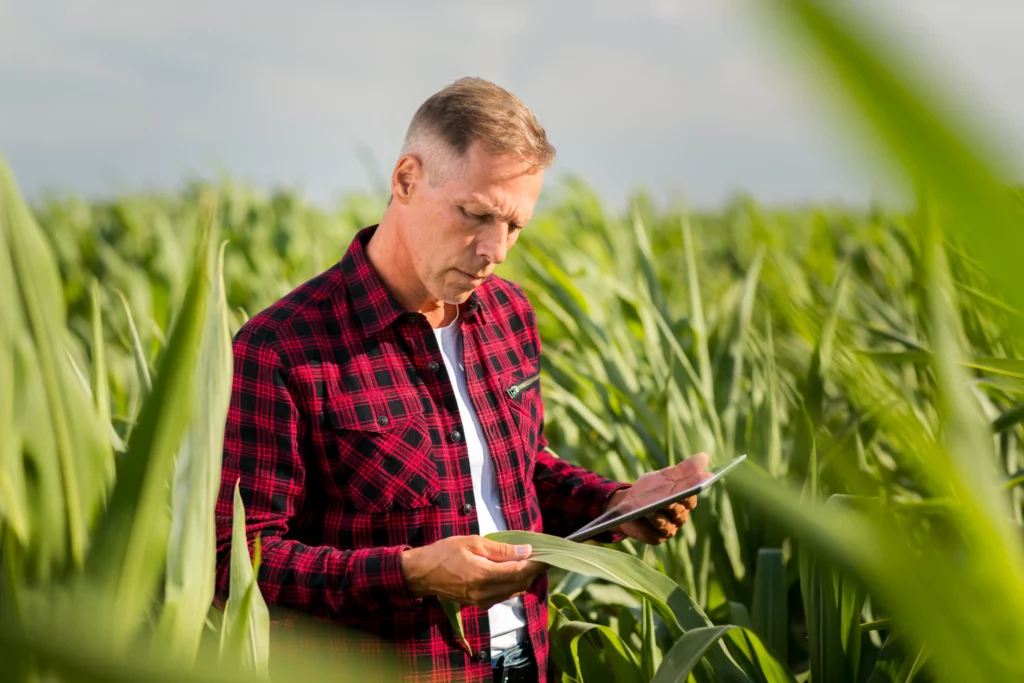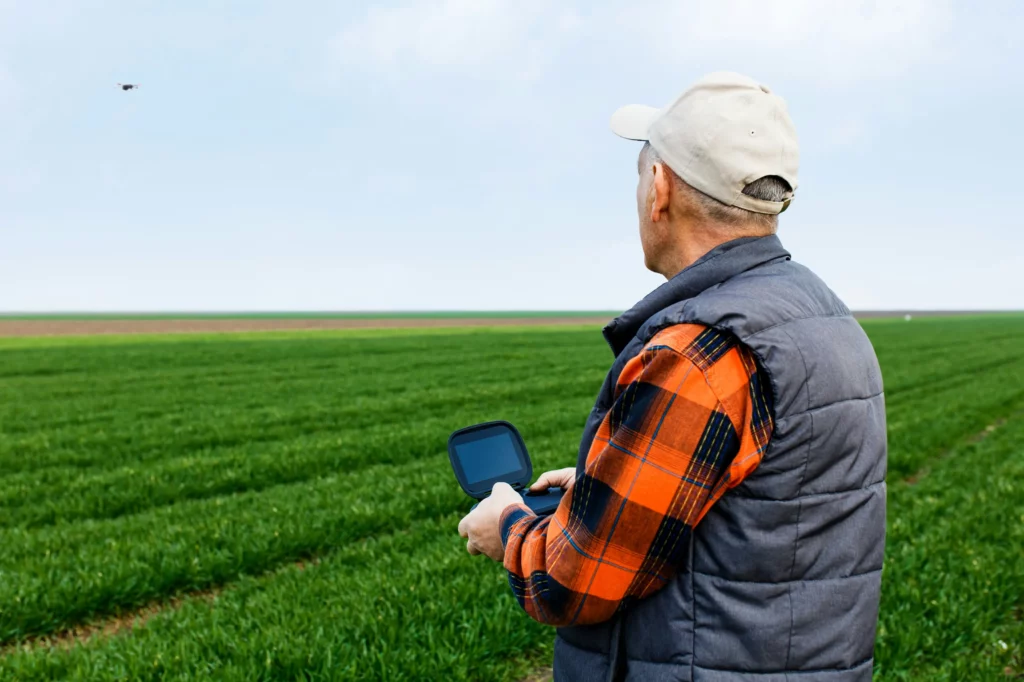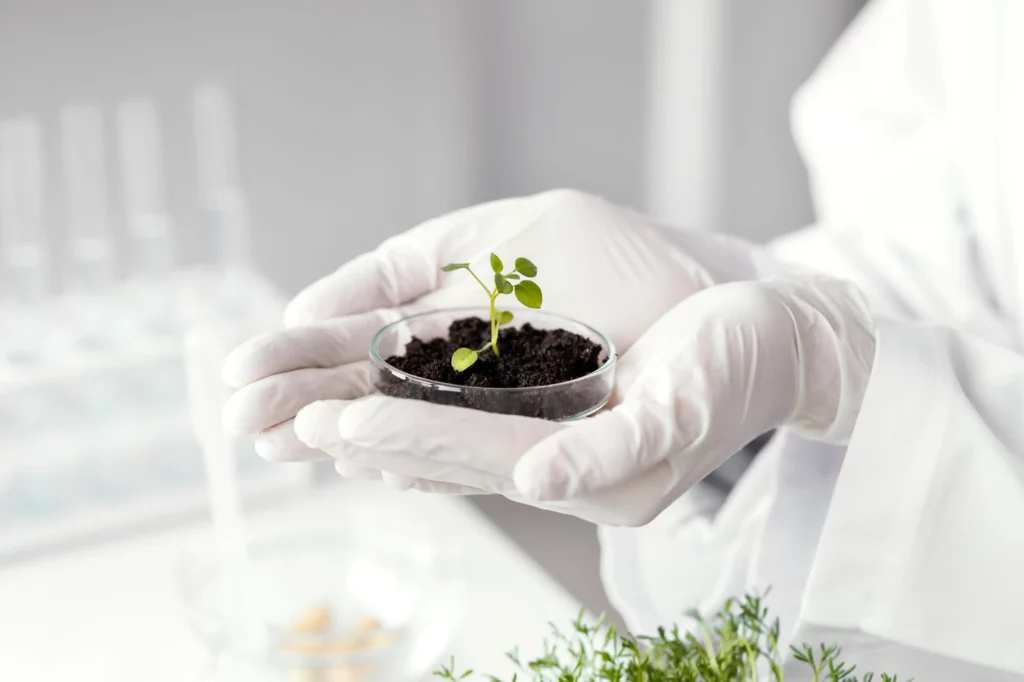
The agricultural sector has long been the backbone of economies worldwide, providing food, fibre, and increasingly, fuel to a growing global population. In recent years, agriculture technologies have emerged as a transformative force in modern agriculture, offering unprecedented opportunities for efficiency, sustainability, and profitability. Among these, precision technology, often referred to as precision agriculture or precision farming, stands out as a method of farm management that revolutionises traditional farming practices. This article delves into the essence of different precision farming technologies as well as PSI® (Plant Signal Induction) Technology, developed by Brandon Bioscience, highlighting their impacts on agriculture, guidance on their implementation, and their role in advancing agricultural sustainability.
What Is Precision Farming Technology?
Precision farming technology in agriculture encompasses a wide array of tools such as GPS guidance, control systems, sensors, robotics, drones, autonomous vehicles, and variable rate technology. It allows for the optimisation of field-level management of crop farming, making precision farming in agriculture a reality. By enabling farmers to observe, measure, and respond to variability in crops with unprecedented accuracy, precision agriculture technology ensures profitability, sustainability, and environmental protection. It harnesses data and analytics for more effective planting, fertilising, and watering strategies, enhancing crop yield and reducing waste.
Impacts of Precision Farming Technology in Modern Agriculture

The adoption of this innovative farming technology like precision technology in agriculture has brought about significant changes in how food is grown around the world. The impacts are profound and multifaceted, touching on various aspects of agricultural production.
1. Increased Efficiency and Productivity
Precision technology enables farmers to use resources more efficiently. The technology used in precision agriculture, for example, GPS-guided tractors can plant seeds and apply fertiliser at precisely the right locations and in the exact amounts needed, reducing waste and ensuring that crops receive optimal care. This precision leads to higher yields and greater productivity on the same amount of land, showcasing the efficiency and effectiveness of farming using technology.
2. Environmental Sustainability
Precision agriculture and sustainability go hand in hand, as these technologies reduce the environmental footprint of farming. By optimising the application of water, fertilisers, and pesticides, precision technology significantly reduces the environmental footprint of farming. It helps in minimising runoff and leaching of chemicals into water bodies, thus protecting ecosystems and reducing pollution. Moreover, efficient resource use translates to lower greenhouse gas emissions, contributing to environmental sustainability and climate change mitigation efforts.
3. Cost Reduction
Precision agriculture technology helps farmers reduce operational costs by minimising waste and improving resource efficiency. Using smart precision agriculture means savings on water, fertiliser, and pesticides, further underscoring the need for precision farming to reduce the environmental impact of agricultural practices.
4. Data-Driven Decision Making
The real-time data and analytics integral to precision agriculture solutions empower farmers with the information needed to make informed decisions. This can include everything from when and where to plant, how to optimise crop rotations, and when to harvest for maximum yield and quality. The ability to analyse and act on data in real-time leads to more responsive and adaptive farming strategies.
How to Implement Precision Farming Technology in Agriculture?

Implementing precision technology in agriculture requires a strategic method that involves several steps:
- Assessment of Needs and Goals: Begin by assessing the specific needs of your farm and defining clear goals for what you aim to achieve with precision technology. This could include increasing yield, reducing input costs, or minimising environmental impact.
- Research and Investment: Investigate the various precision agriculture systems and technologies available and determine which ones align with your needs and goals. This stage may involve consulting with experts, attending workshops, or visiting other farms successfully implementing precision agriculture. Investment in the right technology is critical, so consider both the upfront costs and the potential long-term benefits.
- Training and Education: Ensure that you and your staff are adequately trained to use the new technology. This may involve formal training sessions, on-the-job training, or hiring new staff with the necessary expertise.
- Integration and Optimisation: Integrate the new technology into your existing farming operations. This will likely involve a period of adjustment as you learn to optimise the use of the technology to achieve your desired outcomes.
- Data Management: Develop a system for managing the data generated by precision agriculture technologies. This includes collecting, storing, analysing, and acting on data to inform decision-making processes.
- Continuous Evaluation and Adaptation: Finally, continuously evaluate the performance of the technology and make adjustments as needed. Precision agriculture is not a “set it and forget it” solution; it requires ongoing attention and adaptation to changing conditions and evolving goals.
As we reflect on the continuous evaluation and adaptation necessary for the successful implementation of precision technology in agriculture, it becomes evident that innovation doesn’t stop with just data management and machinery optimisation. This ongoing journey of technological advancement leads us directly to cutting-edge development in the field of PSI® (Plant Signal Induction) Technology pioneered by Brandon Bioscience, which represents a significant leap forward in modern agricultural practices.
PSI® Technology by Brandon Bioscience

Brandon Bioscience has developed PSI® (Plant Signal Induction) Technology, a significant advancement in precision farming technology. This proprietary platform produces specialised biostimulants that enhance crop yield and quality, improve nutrient use efficiency, and increase resistance to abiotic stresses. This technology is grounded in five key pillars: novel marine bioactives, proprietary extraction processes, physicochemical analysis, bioactivity analysis, and field performance. These pillars ensure the production of consistently high-quality and effective biostimulants.
PSI® Technology enables the creation of biostimulants with specific compositions aimed at enhancing crop yield and quality, improving nutrient use efficiency, and increasing resistance to abiotic stresses like salinity and water scarcity. The technology utilises advanced biomolecule complexes derived from Ascophyllum nodosum seaweed, offering solutions like PSI-362 for nitrogen use efficiency and PSI-475 for salinity stress tolerance among others, marking a significant shift from generic seaweed extracts to targeted, functional extracts.
How does PSI Technology by Brandon Bioscience Impact Modern Agriculture?
The PSI® Technology developed by Brandon Bioscience significantly impacts modern agriculture by introducing specialised biostimulants that enhance crop yield, nutrient efficiency, and resistance to stresses like salinity and water scarcity. This technology leverages advanced marine bioactives and proprietary processes to produce targeted, high-quality biostimulants, moving beyond generic seaweed extracts. By addressing specific agricultural challenges, it supports more sustainable and productive farming practices.
Conclusion
The integration of precision technology like PSI® Technology ushers in a new era for agriculture, one that prioritises efficiency and environmental sustainability. These advancements optimise crop yields and resource use, addressing global sustainability and food security challenges. Emphasising precision agriculture for sustainability, the agricultural sector continues to embrace these innovations, moving towards a more productive, agricultural sustainable practice. This ensures a resilient food supply for future generations, promising a harmonious balance between human needs and environmental preservation, and solidifying the role of precision agriculture farming in the future of agriculture.




